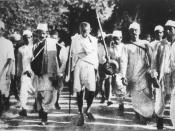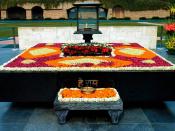Great men and women have walked the earth a thousand times over, and have bestowed upon us their knowledge and wisdom. Men of genius - of peace - guiding the masses, teaching them to teach others, leading them into a world of the future. Mohandas Karamchand Gandhi was among these great men. A leader who served his countrymen by example, and let the world see the potential of human resolve. Affectionately known as Mahatma (translated as "Great-Souled"), he truly shaped the independence of India and Pakistan, freeing them from absolute British rule. Moreover, Gandhi did so without invoking the pain of violence on a single human being. Not even British aggressors. His sacrifices and achievements stand among the most influential and memorable, and his legacy lives with those who know any shred of his story: a legacy of resilience, to be etched into the slate of Man for all eternity.
Sadly, this slate is shrouded in the darkness of an ever-present malevolence, and is being scraped to the bone as more and more arms are drawn towards brethren. Dare we forget such heroism so quickly?
To understand our rejection of such a simple solution, we must learn the history of humans and their favourite pastime: violence. Ancient Man was concerned with one thing: survival. This put us parallel to other species, who have exhibited the same traits throughout all of known history. We hunted, we ate, and then we hunted again. This, of course, was violence, but then why don't animals wage war in the same manner that humans do? The main difference is as follows: Humans began to hoard their excess meat, which then gave them a distinct advantage in survival. As more excess goods were kept, competition for these goods, and for the remaining goods, became strict.


